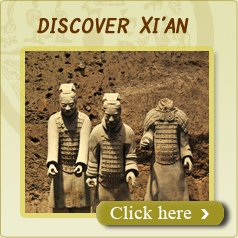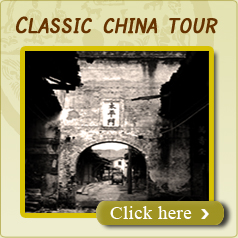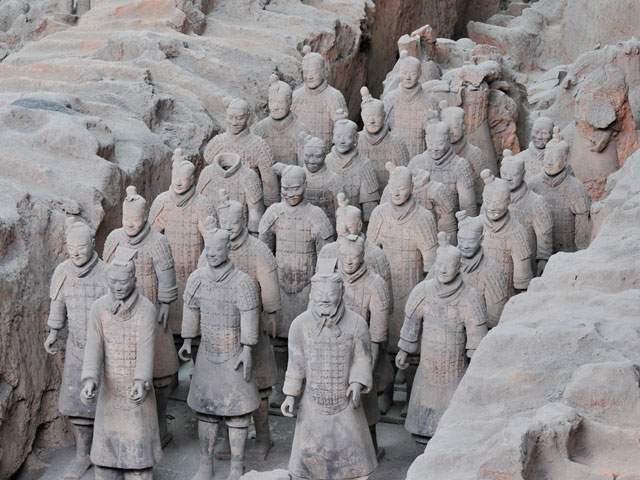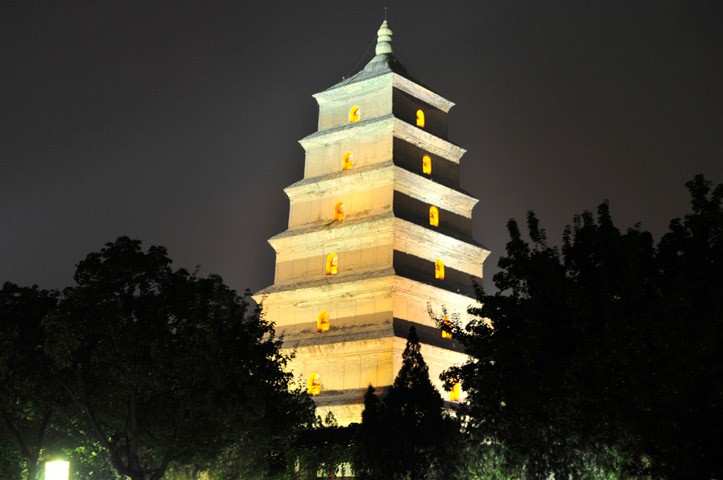Qianling, the mausoleum of Empress Wu Zetian

Qianling is the joint tomb of Gaozong (Li Zhi, 628-683 A.D.), the third emperor of the Tang Dynasty and his Empress Consort, Wu Zetian (624-705 A.D.). Wu Zetian was the only Empress in Chinese history. The tomb lies on Liangshan Hill, 6 kilometers north of Qianxian County, and about 80 kilometers from Xi'an.
Qianling Tomb was built in 684 A.D. It took 23 years to complete Qianling Tomb. It is located on Liangshan Hill, 1,047.5 meters above sea level. Of the three peaks of Liangshan Hill, the north peak, where Qianling is located, is the highest. The two peaks in the south, face each other, east to west. On each of the two peaks stands a watch tower made of earth. According to historical records there used to be two city walls that formed an inner and outer city here. There were four gates and many other splendid buildings, such as the dedicatory hall, and several gate towers.
It was been proven through exploration that the total area of the inner city was about 240 square meters. On each side of the inner city, there was a gate, the Phoenix Gate in the south, the Tortoise Gate in the north, the Blue Dragon Gate in the east and the White Tiger Gate in the west. A monument to Emperor Gaozong located on the western side of the Phoenix Gate, consists of seven joints, which symbolize the Seven Elements, that is, the Sun, the Moon, Metal, Wood, Water, Earth, and Fire. The ancient Chinese believed that the world was composed of these Seven Elements. It measures 6.3 meters high, 1.86 meters wide and weights 61.6 tons. The pedestal for the tablet is carved with various figures of beasts. The inscription on the tablet was composed by Wu Zetian and written by Zhongzong. It contains over 8,000 words, singing the praises of Gaozong's political achievements and military exploits. When the tablet was carved, the strokes of characters were coated with gold fillings, and even today the remains of gold filings on some characters can still be discerned.
The Wordless Tablet on the eastern side of the Phoenix Gate is 6.3 meters high, and weights 98.9 tons. The sides of the tablet were carved with figures of dragon. On the top part of the tablet were carved eight oysters intersecting each other. Placing a tablet with no word, before an emperor's mausoleum, has never been found before in China.
The towers on the eastern and western sides of the inner city are flanked with 61 stone statues. In order to commemorate the heads of the Chinese minorities and the envoys from foreign countries that attended Gaozong's funeral, Wu Zetian ordered these stone statues carved. Dressed in close-sleeved clothes, wide belts round their waists and boots on their feet, they obviously showed no characteristic of the costume of the Han Nationality of the Tang Dynasty. They were saying prayers with their hands cupped before their chests. Most of their heads were damaged long ago. Now only two statues have heads. They have high noses and deep-set eyes and they probably were envoys from the Western Regions of Central and Western Asia. Originally on the back of each stone statue were carved its nationality, official position and name. Being exposed to the weather over the years, most of the characters are already undecipherable, only those on the backs of the two stone statues coming from Iran and Afghanistan, can still be seen.
Qianling Tomb is large in scope with a circumference of 40 kilometers, and 17 satellite tombs of princes, kings and high ministers.





